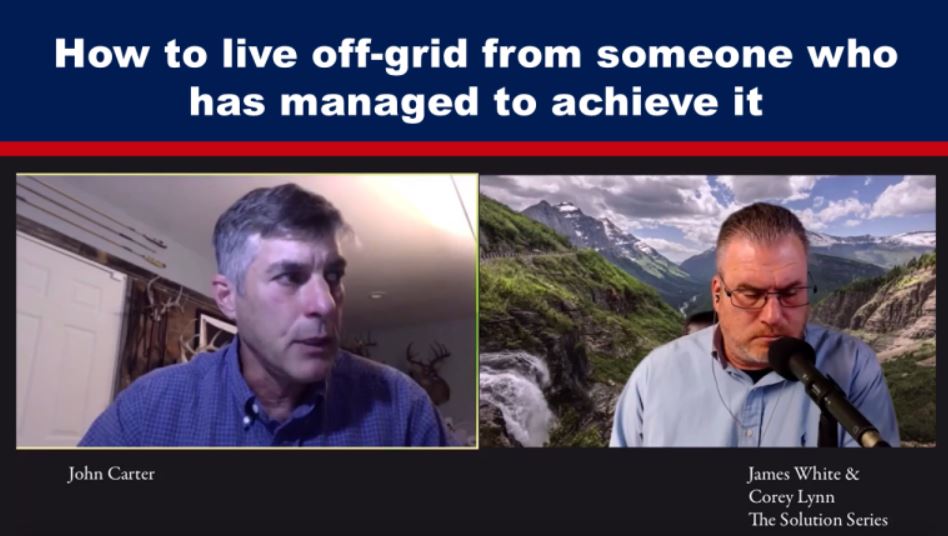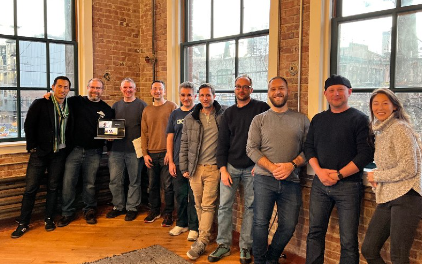In 2022, John Cain Carter joined Corey Lynn and James White to share what he learned from his time in Brazil and his efforts to live off-grid and be self-sufficient on his ranch in Texas.
“I want to break away from this system regardless if things break down or not. I’m kind of fed up with the existing food system; I’m sick of the greed; I’m sick of these companies; I’m sick of their lies,” he said.
Over the 12 months between August 2022 and August 2023, Corey Lynn and James White produced a 24-part video series titled ‘The Solution Series’. The series has now been made available on Coreys Digs for free to everyone.
Each video is accompanied by a brief description and a transcript. The series is orientated to solutions for Americans, however the majority of them will give ideas for those in other countries as well.
The series focused on topics such as food resources and how-tos, local community building, alternative resources, wellness and healthcare, financial tips, survival and preparedness, radio comms and technology. The episodes are as listed below:
- Food Forest Abundance with Jim Gale, 11 August 2022
- Mental and Physical Preparedness with John Cain Carter, 25 August 2022
- Financial Strategies During Wartime with Catherine Austin Fitts, 8 September 2022
- Family Preparedness and Building a Survival Community with Stefan Verstappen, 22 September 2022
- Equip Yourself with Grid-Down Comms with John Jacob Schmidt, 6 October 2022
- Building a Local Force with Your Sheriff with Sheriff Richard Mack, 20 October 2022
- Transitioning into Real Money with Franklin Sanders, 10 November 2022
- Bountiful Food and Self-Reliance with David DuByne, 24 November 2022
- Holistic Health with Nancy O’Brien, 8 December 2022
- Homeopathic Health & Homeschooling with Paola Brown, 15 December 2022
- Off-Grid Living with Rich Scheben, 10 January 2023
- Navigating a Failed Health Care System with Jennifer Walters and Matt R. Hale, 24 January 2023
- Protecting Your Family’s Assets Through Wills and Trusts with Ann Christensen, 14 February 2023
- Protecting Your Home and Real Estate Assets with Marie McDonnell, 28 February 2023
- Securing Your Privacy from Big Tech with Rob Braxman, 14 March 2023
- Self Defence & Situational Awareness with Richard Merfert, 28 March 2023
- RV Living and Traveling Tips with Thom and Robin Walker, 11 April 2023
- The Power of Constitutional Education with KrisAnne Hall, 25 April 2023
- A Journey Through Self-Empowerment, RV-ing, EMF Protections, and Manifesting with Fiona Price, 9 May 2023
- Mastering Field and Radio Tactics with Matt “NC Scout”, 30 May 2023
- How to Become a Local Activist with Patrick Wood, 13 June 2023
- Electroculture and Energy with Matt Roeske, 27 June 2023
- Small Farm Republic with John Klar, 25 June 2023
- Building Wealth with Catherine Austin Fitts and Ricardo Oskam, 15 August 2023
The following is an insight into what was discussed during the second episode of the series with John Cain Carter. You can watch the 60-minute episode on PeerTube HERE.
Mental and Physical Preparedness with John Cain Carter
John Cain Carter has a degree in geology from the University of Texas and attended the Ranch Management program at Texas Christian University. He served in the US Army’s Long-Range Surveillance Detachment/101st Airborne Division in Desert Storm and later moved to the Southern Amazon Basin in Brazil with his wife.
In 2004, John founded Aliança da Terra, a land stewardship movement that now includes over 2,000 farms and ranches, totalling 13 million acres of land, to promote excellence in land management.
In 2009, Aliança da Terra launched the first wildland firefighting unit in the Brazilian Amazon, called Brigada Aliança, which was trained by the US Smokejumpers and Hotshots, and has successfully eliminated uncontrolled wildfires in the region.
Today, he runs his family’s ranch in Texas, USA.
Off-Grid Living
Carter shares his experience of living off-grid in the Amazon frontier in Brazil for seven years, where he learned to live with the bare minimum and rely on diesel generators, solar panels and short-wave radios.
He highlighted the value of being a “Jack of all trades” and having a community with different skill sets, such as electricians, mechanics and farmers, to make survival easier and more enjoyable. Building a community should be a top priority in preparation for uncertain times, he said. It’s possible to grow one’s own garden with minimal land.
Carter emphasised the importance of planning for generator fuel, medications and emergency medical situations, sharing personal experiences of delivering babies, treating snake bites and broken arms. He noted that the local people in Brazil, including non-Indian frontiersmen and native tribes, had extensive knowledge of plants and their medicinal uses, with some plants being referred to as “cure-all” trees.
Power and Water Sources
Regarding power supply, Carter discussed his own setup on his ranch in Texas, which includes a diesel generator, solar panels, a propane generator and a hydroelectric turbine. He emphasised the importance of having a Plan A and a Plan B for power supply and suggested prioritising dense fuels that provide the most energy, such as diesel.
He also highlighted the benefits of having a transfer switch, which automatically turns on the generator when the power goes off, and noted that he has a propane refrigerator and stoves, as well as an inventory of kerosene lamps and candles. He has a shortwave radio with car batteries that can be charged with solar panels and noted that he has taken a “the more the merrier” approach to diversifying his power supply.
He finally solved the problem of power outages once and for all by building his own lake, covering an area of about 100 acres, and building a hydroelectric turbine, which produces 130 kilowatts of power.
To provide a continuous supply of untreated spring water, Carter and his team dug a spring, created a water collection system and installed a water wheel to pump water to the house. However, the system was not foolproof, and they occasionally experienced broken pipes and other issues, including an incident where an anaconda got stuck in the tube, contaminating the water. As a backup, they dug water wells, including a 30-foot deep well at another property, and also used the river and lake for drinking and bathing when necessary.
When asked about collecting rainwater, Carter replied that he hasn’t done so yet but plans to in the future. He is researching and planning to implement a self-sufficient system on one of his sheds, utilising a storage tank and a collection system for well water and has experience with various equipment such as pumps and hand-crank systems.
He emphasised the importance of having contingencies in place, understanding how to troubleshoot and improvise and being prepared for emergencies before they happen. There is always a solution to every problem, he said, and that being prepared and having the right mindset is key to overcoming challenges.
And building a community of like-minded people with principles, values and integrity is crucial for support and safety.
Psychological and Physical Preparedness
Carter believes that temporary power outages and disruptions to essential services are inevitable in the next year or two, but they should not cause panic, especially for those who are prepared with alternative solutions such as propane refrigerators, candles, and a reliable water source.
He believes that having a plan, being prepared and having a positive attitude can help alleviate anxiety and make it easier to cope with challenging situations.
Carter recommended having a stockpile of storable food, such as dried goods, rice and beans, which can be purchased in bulk and stored in sealed containers and also suggests learning how to forage and hunt to supplement one’s food supply.
When asked for three things people can do to prepare, Carter recommends buying freeze-dried food to last for at least a month, having a water filter and knowing where to find clean water, and having a plan for shelter.
If you’re planning to grow your own food, he suggested starting small by planting a tiny garden, about 10 feet by 10 feet, using the right techniques and methods he believes it will provide enough food for a family of four. The Mittleider Gardening Method is a recommended approach for novice gardeners to produce food easily with no experience.
When it comes to livestock, a simple approach is recommended, starting with chickens for a reliable protein source from eggs. For those with more land, goats are a good option for their milk and meat, as they are hearty and easy to care for, while sheep are a secondary option. Honey production is also a viable option for those living outside of cities.
Carter emphasised the importance of being prepared and taking responsibility for one’s own survival, saying that “life benefits the prepared” and that those who do not prepare have only themselves to blame.
Soil Health
Carter’s experience in Brazil, where he didn’t have access to fertilizers, taught him the importance of creating a living biology in the soil, which produced healthy food and had a positive impact on his overall well-being.
At the time the video was made, he was working on creating an ecological system in his small homestead by building up soil and working towards a self-sustaining food system, free from chemicals and synthetic fertilizers.
He noted that starting a garden often requires the use of nitrogen and phosphorus, which can be obtained from stores like Lowes or Home Depot, but these products contain chemicals that can harm the soil microbiology. Instead, Carter is focusing on soil health by feeding the soil, using cover crops, and increasing humus and organic matter content, which releases nutrients and reduces the need for external inputs.
Carter believes that the future of food production lies in simple chemistry and soil chemistry, and that the current system will eventually collapse, making way for a healthier food system. He recommended that people look into alternative methods for producing better soil and reducing their reliance on synthetic fertilizers and chemicals.
Source: https://expose-news.com/2024/12/20/how-to-live-off-grid/
Bitchute: https://www.bitchut,e.com/channel/YBM3rvf5ydDM/
Telegram: https://t.me/Hopegirl587
EMF Protection Products: www.ftwproject.com
QEG Clean Energy Academy: www.cleanenergyacademy.com
Forbidden Tech Book: www.forbiddentech.website













